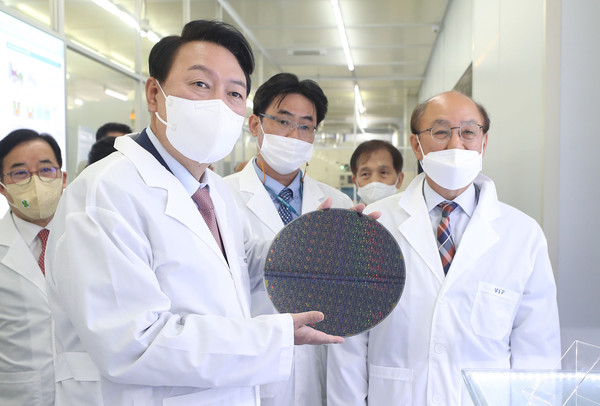On April 29, President Yoon Suk-Yeol held a gathering with eight KAIST graduate students, Mechanical Engineering Professor Kyoungchul Kong, and President Kwang Hyung Lee at the lobby of the National NanoFab Center. Graduate students majoring in diverse branches of science and technology were provided with an invaluable opportunity to freely discuss personal obstacles encountered during their research and requests for reforms to alleviate social and economic challenges faced by researchers today.

Jae Oan Cho, a PhD candidate from the Department of Nuclear and Quantum Engineering, highlighted the importance of maintaining energy security in light of the increasing energy demand. He commented on the need for rapid development of new nuclear reactors and easing restrictions to enable demonstrations to be carried out more quickly. He remarked that new nuclear reactors will give rise to potential markets and emerge as central exports through close cooperation with the shipbuilding industry.
Moreover, PhD candidates Gwangmin Kim from the Department of Bio and Brain Engineering and Dong Yoon Shin from the Department of Mechanical and Aerospace Engineering called for deregulation to lower the barriers for startups for entrepreneurs. Dongheon Lee, a PhD candidate from the School of Electrical Engineering, identified the need to strengthen the Technical Research Personnel System to allow more male students to be selected as research fellows and qualify for alternative military service to ensure their continued contribution to scientific research.
Bokyeom Kim, a PhD student from the School of Electrical Engineering, pinpointed the need for measures to mitigate the lack of human capital in Electrical Engineering. Meanwhile, Hyerin Park, an MS student in the School of Computing, suggested improving services for the disabled to reflect the interests of the users rather than the providers.
In response to the numerous suggestions raised by students in the discussion, President Yoon, who took office on May 10, pledged for increased government support systems and intensive national investment in advanced research and cutting-edge technology. He also promised to provide better incentives and rewards for rising researchers as compensation for their efforts. Additionally, President Yoon aims to bolster collaborations between corporations and universities to catalyze technological breakthroughs and industrial growth.
Before the meeting, President Yoon toured the National NanoFab Center, recognizing its notable contribution to research and to nurturing students into future scientists. He praised the pivotal role of the National NanoFab Center in developing advanced semiconductor technologies and promoting diagnostic kits and antibody nanosensors throughout the COVID-19 pandemic. Terming semiconductors as the “key strategic industry” that will lead the Fourth Industrial Revolution, he pledged to help South Korea grow into a semiconductor powerhouse. Yoon stated, “Semiconductors are at the heart of our nation’s economy and security. War nowadays involves semiconductors, not guns.”
Yoon has constantly emphasized the significance of science and technology-powered economic growth in Korea’s aging society. He remains confident that “all-out investments in science and technology” will enhance the quality of life in Korea while minimizing social divides and tensions. For those reasons, Yoon looks forward to the role of KAIST students and researchers in helping the nation take another leap forward.

